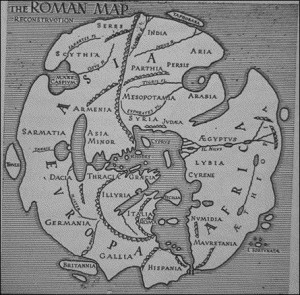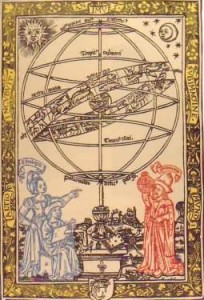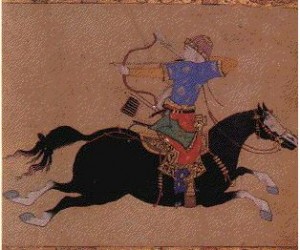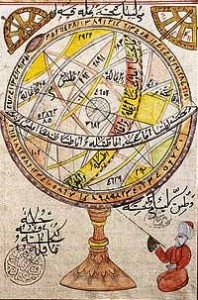Rome.
Jamieson almost felt disoriented. The thought that, across the Mediterranean and up the Italian peninsula was a city which was responsible for all of this. He took a moment to look up, and look over the palace. Brightly-painted reliefs covered the area above the lintels; the statues were painted in life-colors – not the sterile marble-color which had been his lot to observe in museums and books.
The entire complex was alive in color.
As he walked down the hypostyle hall, he noted the tops of the columns, painted a bright yellow-gold, and the columns themselves a bright blue. He realized that the column-color must come from either lapis or cobalt, and the binder was likely lead – but no matter; they were beautiful, just the same.
Bright frescoes of Roman gods and Greek mythology – the Romans having been a practical lot, had borrowed from nearly every culture – gods, myths, all of it. The result had been one of the most dynamic cultures the world had seen.
He found the servant about which Titus had spoken . Now, he had to make himself credible. Servants had masters, and they talked. A lot.
“Servant!”
“Sir!”, said the young man, standing still and bowing his head.
“I am Lucius, of the Jamii, here on official business from Rome to discuss the security of trade-routes with the Governor. I require lodging, food, drink, and bath.”
“I will show you to my master.” Without another word, he turned to walk down the hall.
Jamieson followed. Taking the name ‘Lucius’ made sense; it was a common-enough name, but still strong-sounding. Using his family-name as his gens was an interesting touch – he was sure it would cause some eyebrows to raise, but likely wouldn’t cause any questions. Here, people were what they projected.
A rather-stout man approached them. “What have we here, boy?”
The servant replied, “A man from Rome, sir.” He stepped back; a respectful distance.
Handing him the papers he had so laboriously created back in his own time, Jamieson waited. This was when his ‘credentials’ would either make or break him. Long odds, but worth it.
“Rome! Salve, Sir! You’ll find what you need here. You’ll pardon me – but those unknown to us always pass through me. You understand, I’m sure. What may I obtain for you?”
Jamieson repeated himself, then motioned to the boy, and said “He’s already aware of these things.”
The large man waved the boy off, no doubt to prepare many of these things himself. Jamieson and the man arranged a price, and showed Jamieson to his room. “I’ll arrange to have you presented to Governor Pilate in the morning. He’s got his hands full with a potential rebellion, as I’m sure you’ve heard. This fellow from the hills has the whole area stirred up. Bad business.” Arriving at the door, he said, “Here you are, sir. Have a good evening. My boy will be back in a bit to arrange your bath.”
It wasn’t the Hyatt.
A small cube, it had no bathroom, and no sink. “No mini-bar, either”, thought Jamieson, using the English words in his head for the modern convenience to which he was referencing. Communal flush-toilets – more trough-and-drain than anything else – were the norm in Rome; people did such things more or less in public. No need for anything like that in the room itself, which was only for sleeping.
He placed his satchel on the bed. There was a window with shutters – no glass – so he opened it, and looked down at the city.
The temple-district was just below, with all the bustle that went on there, daily. The dust rose like smoke in the areas around it; people coming and going; carts and animals moving goods and produce – everything was human-scale.
“At least they don’t have to worry about climate change”, he said, half to himself.
“Pardon, sir?” The boy was at his doorway.
“Oh! I was reciting a poem in Cimbri. Trade opens one to new languages. Do you have my bath ready?”
Jamieson wasn’t about to try to explain what he’d said aloud in English, and he knew the boy wouldn’t have known the difference between Cimbri and English – a language which had yet to be born.
“Yes, sir. I’ve arranged food afterward, also.”
“Very well.” Jamieson walked behind the boy, and found himself in an annex which served as the bath-house.
Three rooms – first; a hot bath, then a moderate temperature soak, and finally a cold plunge – the overall effect was marvelous. Thus refreshed, he went to dine with several others who’d been put up in the same place, no doubt to see Pilate on the morrow.
 The news was truly frightening to the travelers. The nervous-energy was palpable; it was the kind of thing which preceded a great event.
The news was truly frightening to the travelers. The nervous-energy was palpable; it was the kind of thing which preceded a great event.
“This fellow has fomented rebellion in the entire province of Judea”, remarked one rather boisterous fellow.
“I hear his followers actually think he’s here to set them all free”, said another.
“Bad for business, this one. He entered Jerusalem on an ass the other day, his followers cheering him on. I’m concerned that there might be rebellion, also.” This one was thin and wiry, and had the look of someone who was always trying to think three steps ahead. In this world, that was never a bad idea.
The loud one continued, “Pilate’ll round him up! Just you wait!”
“He’ll have to”, said another. “His orations speak of a new kingdom. The Emperor will not be pleased.”
“What do you think?” The loud one was looking straight at Jamieson.
“What do I think?” Jamieson smiled, and took another sip of wine. “I think people think too much. This fellow will never amount to anything.”
“You seem to know more than we.” The thin man looked at Jamieson as if trying to get behind his eyes and into his mind.
“No more than you, friend!” Jamieson brushed off the inquiry. This fellow was looking for an advantage; any advantage. Again; probably a good way to survive here.
Jamieson picked at his food. He stuck to wine, although there was water on the table, he questioned its quality, and it wouldn’t do to drop a purification tablet in the stone pitcher in front of everyone.
Fruit in abundance; vegetables and a roast pig – something which was unobtainable anyplace else in Judea – graced the table. It was simple fare by his standards, but excellent, nonetheless. He hoped the fruit was clean. He’d know tomorrow – but he had his medical kit with him just in case.
“So, you, traveler! What’s your story?” The loud man was looking straight at Jamieson.
“I’m here to speak to Pilate about the security of trade routes. I am a Jurisconsult by training.” While he’d researched a bit of Roman law prior to the ‘journey’, using the Roman title for ‘attorney’ was more than a bit of a white-lie. Still, he felt he could manage if asked.
“A Jurisconsult! Well, I’d’ve thought that Rome would have sent someone other than one who practiced law to do this sort of thing – but your sponsors have reasons, no?”
“My sponsors are very close to the Emperor himself.”
The other man backed off quickly. “Well, we all have business here, I’m here to talk trade myself, although not on so lofty a scale. Good luck to you!” He lifted another glass of wine.
Jamieson finished what was on his plate, then stood. “Thank you all for your company. I’m going to retire for the evening.”
The others wished him well, and went back to their dining couches and their wine.
Jamieson thought, “Let them drink”, he thought. “I’ve other things to do.”
Jamieson was ushered into a large waiting room – a hall, really – to wait his turn to see Governor Pilate. Guests were arranged on the benches in a strict order by rank; as he was a Jurisconsult – an attorney in ancient Rome – with credentials, he was in the first third of those to be admitted. Still, this event could take all day, so he sent Titus, who’d shown up bathed, shaved, fed, and dressed in a proper tunic, out for some food.
As time passed, he gathered the gravity of the situation. The governor’s offices were full of people coming and going with dispatches – these were scribes and runners who were being sent to city officials and military outposts.
There were rumors of calling up the legions for crowd control and to keep a lid on potential rebellion.
A scribe touched his arm. “Sir? Your servant is in the hallway.”
Jamieson walked to the entrance and into the hallway. “Titus! What have you?”
“Fruit, roast duck, and a little wine. No pork. Can’t get it here; not from street-vendors.”
“Did you feed yourself?” Jamieson was concerned about the man; it was also good business.
“Yes, sir! The same as you have now, if you don’t mind.”
“Not at all. Thank you for this, Titus. You have a place to wait?”
“Yes sir! Outside. They let me in for this only. I’ll be all right. I hear these things can take quite a while.”
Jamieson nodded, then returned to the hall and his waiting spot. Others had done the same; they were snacking on fruit, nuts, and whatever their servants had brought them.
Eventually, it came his turn.
He walked through a large door into a capacious office. Pilate was a short, round man with graying hair; seated at a large table with stacks of paper on it, he was surrounded by scribes and other people to whom he’d been dictating a rapid-fire stream of correspondence. Three sweating runners – no doubt back from some other parts of the city – were waiting for their next assignments. After formal introductions, Pilate got right to the point.
“So – you’re here for trade?”
“Yes sir, and to discuss this whole rebellion matter.”
“And? Did Rome send you?”
“Yes, Governor.” Jamieson presented his ‘credentials’. Pilate looked at them. He’d seen enough of Augustus’ signature to recognize the real thing. This was genuine – or it appeared so.
Jamieson breathed again when Pilate said, “Well, these papers are certainly in order.” To the others in the room, he said, “Leave us!” Everyone around him seemed to vanish.
“What does the Emperor want?”
Showtime.
“The Emperor is concerned that there might be problems with this rebellion that’s brewing. This fellow who’s just been arrested – this Jesus fellow – the Emperor is concerned that we do nothing to impact trade or relations with the local residents by creating this fellow a martyr.”
“His trial is tomorrow. Are you suggesting we subvert justice?”
“On my oath as a Jurisconsult, no!”, said Jamieson. “I’m stating that the trial actually has two parts – you have the local religious people who are demanding this man on a cross outside of town, and you have the charge of treason, in the manner of considering himself a ‘god’ of sorts.”
“Continue.” Pilate tented his fingers and leaned back in his chair.
“You have the power under Roman law to supersede any and all local laws. The religious folk can have their day in court, but in the end it’s no matter. What really counts is this treason charge.”
Pilate nodded, slowly.
“If we put this fellow up on a tree outside the city-gates, he becomes the focal point for every last troublemaker within a thousand milia.” Jamieson let his words sink in.
“On the other hand, if you let him go – he becomes a non-sequitur. He becomes irrelevant.”
“I see.”, said Pilate, nodding slowly. “And, is this what the Emperor himself wants?”
“Yes.”, said Jamieson, looking directly into Pilate’s eyes.
“Then that is what I shall do. I shall declare that this man will go free, pardoned of any crime, and that no harm shall befall him. He can go back to the hills and preach to his heart’s content. Of course, half of the people hereabouts think this man is quite mad. Half hope he’s some sort of prophet, who will lead them in a rebellion against Rome.”
“Sir, this is just what the Emperor wants. If we make an example of him, his followers will grow in power. On the other hand, if you release him, the chances are that he’ll either fade into obscurity, or someone will simply kill him. Either way, the problem is solved.”
“But – what if this fellow comes back with an army.”
“He won’t. Or, should I say, the Emperor doesn’t believe he will.”
“Very well, then. The trial is a show. It means I’ll have to sacrifice to Jupiter, but that’s a small thing.”
“This should cover the expense. Consider it authorized by the Emperor.”, said Jamieson, pulling a small gold aureus from his purse and sliding it across the table. “Ensure that Jupiter gives you fair dispensation.”
Pilate smiled. “Very well. Tomorrow; then. Let’s hope the Emperor is right. If not, he’ll have to send five legions here to clean up the mess, and I won’t look good at all.” Turning to the doorway, he raised his voice.
“Scribe! Enter!”
“Take a note, and get the next post-cart for Rome. This one goes to the Emperor.”
Jamieson froze.
“Tell him that I have received his representative, and that the trial of this Jesus will go as he has requested.”
Turning to Jamieson, he said, “That covers my backside. I’m sure you understand.”
“I do, sir.”
“So – you won’t mind if I keep you here until I receive a response?”
Jamieson froze again.
“Why, no, sir! Not at all!” Jamieson hoped his attempt to sound cordial came across as nothing other than that. Besides, Jamieson had the ability to leave any time he wanted – as long as the response took longer than two days – and that sort of communication was far in the future.
“Good! Protocol, you understand.”
_________________________
“I am.”
Jesus’s response to the question caused the religious leaders as well as the people in the gallery to howl. They demanded his blood, where just a few days ago they’d hailed him as King.
It was his own statements which had condemned him in the eyes of the mob. He’d declared his ‘kingdom’ to be ethereal, not temporal – and this, in the end, was the undoing of any pretender-to-leadership; failure to tell the people what they wanted to hear.
They’d wanted a King – not an ethereal ‘kingdom’. They wanted a revolutionary leader who’d bring freedom to their little corner of the Eastern world. What they got was abstract ideas – and now they were all too ready to cast him aside in favor of the next one who’d tell them another story – as long as it was what they wanted.
“This man has committed no crime in the eyes of Rome”, said Pilate. “And I refuse to be ordered around by a mob.” The night before, Pilate had worked long into the wee hours, sending runners to the Roman garrisons around the city and beyond its walls, ordering the men turned out in full kit and ready to put down any disorder, no matter how small, in the most brutal fashion. There was a lid on Jerusalem – metaphorically; a large, heavy, bronze-helmeted Roman lid – and nothing was going to happen; not today.
“It’s Passover!”, screamed one man. “You must give us one of our own!”
“Then I pardon this Jesus. He is yours today.”
“There are two others! Give us one of them instead!”, screamed another.
“My order is final. Jesus is yours.” Pilate walked from the balcony above the courtroom; the soldiers there began roughly clearing the galleries and the main hall with the flat of their swords and the occasional prod of a pilum.
Two of Jesus’ followers quickly escorted him from the room – a wild-eyed, bedraggled-looking man who was destined for obscurity.
The trial was over.
_________________________________
That evening, Jamieson was seated in the triclinium with some new faces, and some regulars. The loud man was gone; the wiry one was still there, having business which was taking longer than he had anticipated.
“Pilate sure showed those folks today! What a genius! Didn’t nail that fellow up, so his people couldn’t use him to stir trouble. A master-stroke, truly!” The wiry man was looking directly at Jamieson.
“Yes, it was.”, he said. “It was.”
“Legions have this place under lock and key”, said another man, in Judea from Syria. “Never seen a province under a fist like this one. I wonder how long they can make it last?”
“As long as they want to, I imagine”, said Jamieson. “I wonder what’s going to happen to this fellow. The one the Governor released today, I mean.”
“Didn’t you hear? His followers left town in a hurry. Back to the hills. I suppose they’ll stay there this time. Hills around here are full of obscure preachers. Legions’ll keep a lock on things for a while, then they’ll get back to normal.”
Jamieson smiled to himself. “Pull its teeth; then it’s no trouble,”, he thought.
“What’s that, friend? What’s so funny?”, said the wiry fellow.
“Oh, I was just thinking – it’s – he struggled for the word in Latin – ‘ironic.’ You understand my meaning?”
Jamieson stood, and excused himself.
He had an appointment with a fellow a few hundred years in the future.
Having bidden farewell to Titus (and paid him off), Jamieson was wondering if he should go back to his own time, or finish the job he’d set out to do.
 He would be in grave danger. While the officials in Jerusalem had looked askance at his unidentifiable accent (he’d been able to pass himself off as someone who’d traveled extensively, and thus his Latin had become ‘corrupt’), he spoke no Arabic.
He would be in grave danger. While the officials in Jerusalem had looked askance at his unidentifiable accent (he’d been able to pass himself off as someone who’d traveled extensively, and thus his Latin had become ‘corrupt’), he spoke no Arabic.
He’d be out of place in a toga – so he’d purchased clothing which an upper-class merchant or trader would have worn; the thing about ‘fashion’ was that it was more or less timeless until the Renaissance – a good thing, in this case.
Mecca was farther east than the Romans had ever gone in that region – while the region was nominally part of the Parthian Empire, the Romans had never gone there – they’d never attempted the trackless wastes of Arabia.
To be sure, they’d tried – twice – to conquer Parthia, but what Alexander had done in a prior era, the Romans could not replicate. Parthian heavy cavalry was the best in the known world, and they seemed to have millions of horses. They were the only people Rome hadn’t beaten in a straight-up fight.
While some people there no doubt spoke Latin, it wouldn’t be a benefit – it might even be a liability.
He’d have to find a person speaking a language he didn’t know – and communicating with other traders who spoke Latin. This would be difficult – but not impossible.
There’d be no finessing the situation, as he did back in Jerusalem.
Standing there in his room, he left a sestersius on the wooden chest by the bed – final payment for the hospitality of the staff – and reached into his satchel, removing a large device which looked like a remote-control on steroids.
Stepping into the center of the room, he pressed a button. A grey cloud-like structure appeared in front of him. He pressed two more buttons – instructions to the machine back in his lab to set transfer coordinates.
A green LED glowed on his hand-held. He pressed a third button, which changed the cloud from grey to a blue – this was the actual wormhole which would take him to Mecca.
He stepped into it, and was gone.
____________________________________________
Mecca was another dusty, odiferous town – not much had changed in the 585 years since Jerusalem was a Roman province.
Now, the Romans were history – at least, in his era. Rome had fallen in 476CE – but he had no idea of his impact on the timeline since his efforts in Jerusalem.
In retrospect, it was a good thing he’d packed his toga in the satchel. Quickly placing his handheld in the satchel, he looked with amazement at the Roman soldiers in the market square. The uniforms and equipage were different, to be sure, but these fellows were Roman; no doubt about it. Arab traders hawked merchandise; their lilting language a contrast to the rough frontier-Latin of the soldiers who were there to keep order. A detachment of Legionnaires marched by; their Centurion keeping time in Latin; equipment clanking and rattling at each step.
By Jamieson’s calendar, it was 618CE – and Mecca was a Roman city.
Jamieson ducked around a corner. There was an abandoned booth-stall; he entered it quickly and closed the shutters behind him. Changing into his toga, he wondered if he could pull off his “Lucius” persona again without credentials.
Dressed again, he stepped out of the market-stall and approached the Centurion in the market-stalls he’d seen earlier.
“Salve, Centurion!”
“Salve, Sir!”, said the startled captain. “We don’t see many citizens here. How may I assist?”
“I’ve come a far journey, as you might imagine. I’ll need proper lodging and food. Where do I find such?”
“Toward the end of the forum, sir, then to your right. The governor’s compound is there.”
“One thing about any civilization”, thought Jamieson. “Those in charge see to it that the best of everything is nearby.”
He introduced himself at the traveler’s lodge, but feigned weariness and robbery for a lack of credentials. He removed another sestersius from his purse, handed it to the government-innkeeper, and said “I suppose you’ll just have to trust me.”
As with most things, money bought acquiescence and silence. The innkeeper showed him to a room not unlike the one he’d left behind over five hundred years before.
The bath had changed little, also – though Roman trade had discovered the use of soap, and while he was sure there was lye in it, he didn’t mind. He scrubbed in the bathing-room; soaked in the hot bath, and took the cold-plunge with some relish.
They’d sent his toga out (two As covered the cost of cleaning and chalk-whitening); he was ready for another day just as soon as he could feed himself.
Minus his toga, he’d have to wait until they got it back to him – he wasn’t proper company for the triclinium, dressed in a tunic, so he requested a modest midday meal in his room – something people were doing now, also. Apparently, the Empire was not as class-conscious as it had been in the early days.
He wandered the Forum and asked the few Romans who were about regarding the state of things in Arabia and the Empire – again; feigning a long trip and being out of touch enabled the questions to be put with no suspicion.
Some of the snippets of conversation kept coming back to him as he walked back to his room that evening.
“…of course they finally had to put down a huge rebellion in Judea, but that was years ago.”
“…good thing the Gods have looked after us. We’ve been free of internal conflict for four hundred years now.”
“…we’ve got over two hundred legions and the best navy in the world.”
“…conquering the Parthians, moving across the Danube in force and dealing with the tribes north of Anatolia did more to secure the borders than most would have thought.”
“…damn Huns and Goths tried to break us – we showed them a thing or two!”
Jamieson had learned that the Empire, free from the internal conflict of a new and disruptive religion, had actually thrived, and pushed eastward. Parthia was now a Roman province. The concept of modern day Iran – along with all of the Arabian peninsula – under Roman control was mind-boggling.
Evidently, the cost was high.
The Hun and Gothic invasions had slammed against twenty legions at the borders. Alaric, Attila, and the rest were bested before ever entering Italy.
 Defeating Parthian cavalry meant the loss of twelve legions before the Parthians were brought to heel. The Romans had passed a law that no ethnic Parthian could own any transport-animal larger than a donkey, and oxen were all branded so they couldn’t be traded for horses.
Defeating Parthian cavalry meant the loss of twelve legions before the Parthians were brought to heel. The Romans had passed a law that no ethnic Parthian could own any transport-animal larger than a donkey, and oxen were all branded so they couldn’t be traded for horses.
Parthian horses were literally rounded up and sent to Italy; Roman cavalrymen rode them now, and bred them for the purpose. No horses remained in Parthia.
As a result, Rome now had an uninterrupted trade route to the east – Cathayan silk; Indian spices, and exotic woods and perfumes flowed back toward Roman cities.
The local inhabitants, while unhappy that they were ruled by outsiders, had learned their lesson: Opposing Rome carried a huge price-tag. They were now content to trade – and as uninterrupted trade with Rome was lucrative, they’d transformed into a province of very good traders.
________________________________
Dinner came; his toga cleaned and chalked, he entered as a proper Roman should; he learned that while seating had become a bit more casual – people were no longer seated due to their rank – the age-old triclinium couch was still the preferred method of seating for consuming the evening meal.
During dinner, he learned that the locals preferred their own gods to Roman ones; this caused no great uproar – the Emperor (a man who went by the title Augustus VI) had even built new temples to the Parthian god Ahura-Mazda.
“One god is much like another”, said a loud man at the other end of the couch. Jamieson thought, “Some things never change. I wonder if this fellow is a direct descendant of the man I met in Jerusalem?”
The conversation turned from the local gods to law – “In any era, it seemed religion and politics were the two topics for endless conversation-fodder between complete strangers”, thought Jamieson.
“You! What do you think of the new law?” The loud man had asked Jamieson a question while he was deep in thought.
Apologizing, Jamieson said, “Please rephrase that – I didn’t quite understand your meaning.”
Rolling his eyes, the loud Roman said, “I asked you what you thought of the new edict against seditio.”
“I’m not aware of it, and as I haven’t read it yet, cannot render an opinion.” Jamieson was as dignified as he could be.
The other man snorted. “Jurisconsults! You’re all alike – no opinions without volumes of reading, first!”
Jamieson reflected on the concept of propriety – and how things had changed. This fellow’s first-century counterpart would have never dared speak to a Roman attorney in this manner –
“Anyhow”, continued the other man, “It all came about because of this Mohammed fellow. Lived in a cave hereabouts; was trying to start some new religion; going on about Moses and that bunch.”
“What happened to him? I’ve been traveling a good while, and only arrived here today.”
“Locals killed him, is what. I don’t imagine they talk about us much back in Rome, but life’s been pretty good here since we took the place over about eighty years ago. More trade; everyone’s working. Even the locals agree there’s not much room for another troublemaker. Still – the Governor wants to keep a lid on things, so he issued a new edict – stirring up the locals from now on won’t be tolerated.”
Jamieson couldn’t help himself; he started laughing.
“What’s so funny, friend?”, said another diner.
“Oh nothing! I suppose it was the way he told the story!” Jamieson absent-mindedly fingered the Taser in his bag.
“I suppose I won’t be needing this”, he thought.
After dinner, Jamieson returned to his room to reflect on what he had experienced and accomplished.
 The Roman Empire ran the known world. By embracing other cultures – and everyone’s gods (rather than trying to replace them), there was now a crude form of steam-power running ships (there were even Roman explorers considering a trip across the Atlantic); optics had made it possible to see the outer planets (ironically, an Arabic invention); the development of mathematics and medical science had advanced, due to the fact that there was no Dark Age.
The Roman Empire ran the known world. By embracing other cultures – and everyone’s gods (rather than trying to replace them), there was now a crude form of steam-power running ships (there were even Roman explorers considering a trip across the Atlantic); optics had made it possible to see the outer planets (ironically, an Arabic invention); the development of mathematics and medical science had advanced, due to the fact that there was no Dark Age.
“Imagine,” Jamieson said to himself, “what I’ll find when I get home.”
Home.
That was somehow a scary and exciting thought. It was the word “home” which he considered as he fell asleep.
Next – Home; And a Twist in Time….



And so we continue with the dual struggle between man’s desire to save earth and the desire to allow humanity free will. When we start playing at gods, how agonizing are the choices we hear them make.
“When we start playing at gods, how agonizing are the choices we hear them make.”
Which, after all, was the point of this piece….
(Thanks for ‘getting it’, as I knew you would…)
-W
Great writing style. Looking forward to the next installment.
It seems that just like life, religion will find a way, it will be interesting to see what is found at home.
“Home” will be a very different construct, as we’ll see next week…..
I’m thinking that you can’t go home again…it’s going to be a little different…excellent writing as always Will.